Related Research Articles

Badfinger were a Welsh rock band formed in 1961 in Swansea. Their best-known lineup consisted of Pete Ham (guitar), Mike Gibbins (drums), Tom Evans (bass), and Joey Molland (guitar). They are recognised for their influence on the 1970s power pop genre. It is estimated that the band sold 14 million records.

No Dice is the third studio album by British rock band Badfinger, issued by Apple Records and released on 9 November 1970. Their second album under the Badfinger name, but their first official album under that name, and first to include guitarist Joey Molland, No Dice significantly expanded the British group's popularity, especially abroad. The album included both the hit single "No Matter What" and the song "Without You", which would become a big hit for Harry Nilsson, and later a hit for Mariah Carey.

Straight Up is the fourth studio album by the Welsh rock band Badfinger, released in December 1971 in the United States and February 1972 in Britain. Issued on the Beatles' Apple record label, it includes the hit singles "Day After Day" and "Baby Blue", and the similarly popular "Name of the Game", all of which were written by singer and guitarist Pete Ham. The album marked a departure from the more rock-oriented sound of Badfinger's previous releases, partly as a result of intervention by Apple Records regarding the band's musical direction.

Peter William Ham was a Welsh singer, songwriter and guitarist best known as a lead vocalist of and composer for the 1970s rock band Badfinger, whose hit songs include "No Matter What", "Day After Day" and "Baby Blue". He also co-wrote the ballad "Without You", a worldwide number-one hit for Harry Nilsson that has become a standard covered by hundreds of artists. Ham was granted two Ivor Novello Awards related to the song in 1973.
"Without You" is a song written by Pete Ham and Tom Evans of British rock group Badfinger, and first released on their 1970 album No Dice. The power ballad has been recorded by over 180 artists, and versions released as singles by Harry Nilsson (1971), T. G. Sheppard (1983) and Mariah Carey (1994) became international best-sellers. The Nilsson version was included in 2021's Rolling Stone's 500 Greatest Songs of All Time. Paul McCartney once described it as "the killer song of all time".
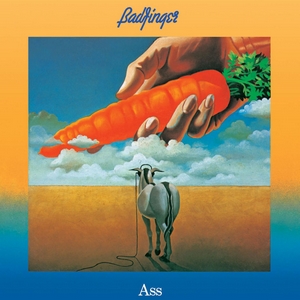
Ass is the fifth studio album by British rock band Badfinger, and their last album released on Apple Records. The opening track, "Apple of My Eye", refers to the band leaving the label to begin its new contract with Warner Bros. Records.

Joseph Charles Molland is an English songwriter and rock guitarist whose recording career spans five decades. He is best known as a member of Badfinger, the most successful of the acts he performed with. Since 2005, Molland is the last surviving member from the band's classic line-up. He lives in Minneapolis, Minnesota.
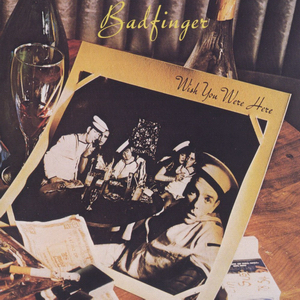
Wish You Were Here is the seventh studio album by rock band Badfinger and their third consecutive album produced by Chris Thomas. It was recorded in the spring of 1974 at Colorado's Caribou Ranch and released in November of that year on Warner Bros. Records. Wish You Were Here was the second and last album the band released on the Warner Bros. label.
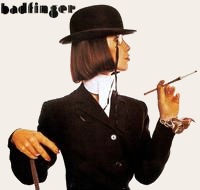
Badfinger is the sixth studio album by British rock band Badfinger. The album was recorded in autumn 1973 and released in 1974 on Warner Bros. Records. It was the first of two albums released by the band on the Warner label. The cover art for the album shows a woman wearing a riding outfit and hat from the 1920s and smoking a cigarette in a cigarette holder.

"No Matter What" is a song originally recorded by Badfinger for their album No Dice in 1970, written and sung by Pete Ham and produced by Mal Evans.

Thomas Evans was an English musician. He is best known for his work as the bassist of the band Badfinger.

"Day After Day" is a song by the British rock band Badfinger from their 1971 album Straight Up. It was written by Pete Ham and produced by George Harrison, who also plays slide guitar on the recording. The song was issued as a single and became Badfinger's biggest hit, charting at number 4 in the United States and number 10 in the UK, ultimately earning gold accreditation from the Recording Industry Association of America.

BBC in Concert 1972–1973 is a CD of live recordings by the British rock group Badfinger released in 1997 by Strange Fruit Records and then re-released in 2000 by Fuel 2000 Records. The recordings were made for the BBC in 1972 and 1973, in two separate concerts at the Paris Theatre in London. The album also includes a 1970 BBC recording of Badfinger's first Top 10 hit, "Come and Get It".

"Baby Blue" is a song by Welsh rock band Badfinger from their fourth studio album, Straight Up (1971). The song was written by Pete Ham, produced by Todd Rundgren, and released on Apple Records. As a single in the US in 1972, it went to #14. In 2013, the song was prominently featured in the series finale of the television show Breaking Bad. As a result, the song charted in the UK for the first time, reaching #73.

"Apple of My Eye" is a song recorded by the rock/pop band Badfinger for inclusion on their 1973 album, Ass. The song was written and sung by Pete Ham, produced by Chris Thomas and Badfinger, and released on Apple Records.
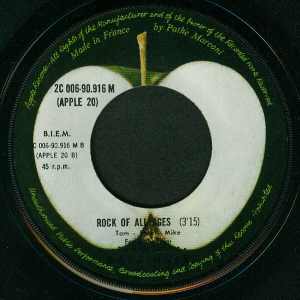
"Rock of All Ages" is a song written by Tom Evans, Pete Ham and Mike Gibbons that was first released on Badfinger's 1970 album Magic Christian Music. It was also released as the b-side to Badfinger's hit single "Come and Get It". The song was originally used as part of the soundtrack for the 1969 film The Magic Christian, starring Peter Sellers and Ringo Starr. The song was produced by Paul McCartney.
"Carry on Till Tomorrow" is a song written by Tom Evans and Pete Ham that was first released on Badfinger's 1970 album Magic Christian Music. It was also used in the film The Magic Christian, starring Ringo Starr and Peter Sellers. An edited version was later used as the b-side of Badfinger's single "No Matter What" in the United States.
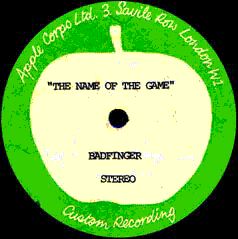
"Name of the Game" is the sixth track from power pop band Badfinger's 1971 album, Straight Up. The song was written by Pete Ham.

"I Miss You" is a song by the British power pop band, Badfinger. Written by Pete Ham for their first Warner Bros. LP (Badfinger), it served as the opening track and sole U.S. single for said album.
"Meanwhile Back at the Ranch"/"Should I Smoke" is a medley released by the British power pop band Badfinger. The song was the closing track on their critically acclaimed but commercially unsuccessful album, Wish You Were Here. "Meanwhile Back at the Ranch" was written by Pete Ham, while "Should I Smoke" was penned by Joey Molland.
References
- 1 2 3 4 5 6 Day-Webb, Robert (2022). Badfinger: Every Album, Every Song. Sonicbond. pp. 62–63. ISBN 9781789521764.
- ↑ Woodward, Tim (February 18, 1973). "Jazz-Rock Blend Highlights Work". Idaho Statesman. p. 2-D. Retrieved 2024-03-20– via newspapers.com.
- 1 2 3 4 Matovina, Dan (1997). Without You: The Tragic Story of Badfinger. Frances Glover Books. pp. 138, 212. ISBN 9780965712200.
- 1 2 3 4 5 Mason, Stewart. "We're for the Dark". Allmusic. Retrieved 2024-03-20.
- ↑ Clark, Rick (1995). Woodstra, Chris; Erlewine, Michael; Bogdanov, Vladimir (eds.). All Music Guide to Rock. Miller Freeman. ISBN 9780879303761.
- ↑ Mars, John (November 28, 1981). "What's Shakin'". Expositor. p. 13. Retrieved 2024-03-20– via newspapers.com.
- ↑ Kopp, Bill (June 10, 2022). "5 wrongfully overlooked Badfinger songs". Goldmine. Retrieved 2024-03-20.
- ↑ McLeese, Don (January 23, 1997). "Harmony Present". Austin American-Statesman. p. 30. Retrieved 2024-03-20– via newspapers.com.